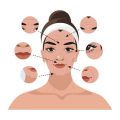Introduction to Rosacea in the UK
Rosacea is a common yet often misunderstood skin condition that affects a significant number of people across the UK. Characterised by persistent redness, visible blood vessels, and sometimes small red bumps on the face, rosacea can have a considerable impact on one’s self-confidence and day-to-day life. It is especially prevalent among individuals with fair skin, which explains its higher incidence in Britain compared to some other regions. In recent years, increased awareness and open conversations about skin health have brought rosacea into the spotlight, highlighting its importance within our communities. Understanding the conditions unique presentation among people living in the UK is crucial for accurate diagnosis, effective management, and dispelling common misconceptions. Whether you or someone you know is affected by rosacea, learning more about its causes, symptoms, and prevailing myths can empower you to approach this condition with empathy and confidence.
2. Common Causes of Rosacea: British Perspectives
Understanding what triggers rosacea is vital for effectively managing and minimising flare-ups—especially when living in the UK, where climate, diet, and daily routines can play a significant role. While the precise cause of rosacea remains unknown, research suggests that both genetic and environmental factors contribute. For Britons, certain aspects of local life are particularly influential. Let’s explore these primary causes with a focus on UK-specific influences.
Climate and Weather Conditions
The famously unpredictable British weather is more than just a topic for small talk—it can be a genuine challenge for those with rosacea. Sudden temperature changes, brisk winds, frequent rain, and chilly air can all aggravate sensitive skin. Central heating during cold months may also dry out skin or lead to flushing, making it crucial to adapt your skincare routine as seasons change.
Dietary Influences
What we eat and drink has a real impact on rosacea symptoms. In the UK, popular foods and beverages such as hot tea, spicy curries, alcohol (especially red wine), and rich dairy-based treats can be common triggers. Below is a quick reference table summarising these dietary factors:
| Potential Trigger | Common British Examples | Effect on Rosacea |
|---|---|---|
| Hot Beverages | Tea, coffee | May cause facial flushing |
| Spicy Foods | Curry, chilli sauces | Often leads to flare-ups |
| Alcohol | Red wine, beer | Can increase redness and sensitivity |
| Dairy Products | Cheese, creamy desserts | Might exacerbate symptoms in some individuals |
Lifestyle Factors Unique to the UK
The pace and habits of daily life in Britain also influence rosacea. Stress from work or commuting in busy urban centres like London can heighten inflammation. Additionally, exposure to pollution—a growing concern in major cities—has been linked to increased skin irritation.
Other Noteworthy Triggers:
- Sun Exposure: Despite the UK’s reputation for grey skies, occasional sunny spells can catch people off guard—always use sun protection.
- Personal Care Products: Fragranced or harsh skincare items commonly found on British high streets may irritate sensitive skin.
- Exercise: Intense physical activity indoors or outdoors can prompt flushing; consider moderating your routine or exercising in cooler environments.
Your Takeaway for Everyday Life in the UK:
No two people are affected by rosacea in exactly the same way, but being mindful of these uniquely British triggers empowers you to make confident choices for your wellbeing. With gentle self-awareness and a willingness to adapt your habits seasonally or socially, you can manage rosacea more effectively while embracing everything the UK lifestyle has to offer.
![]()
3. Recognising Rosacea: Typical Symptoms and Signs
Spotting the signs of rosacea early can make a world of difference in managing this common skin condition, especially here in the UK where our climate and lifestyle can play their part. Rosacea often begins subtly, so it’s important to know what to look for—whether your skin is fair, olive, or deeper in tone. For many, the first tell-tale sign is persistent facial redness, most noticeable across the cheeks, nose, chin or forehead. In lighter skin tones, this often appears as a rosy flush or frequent blushing that doesn’t fade away easily. However, for people with medium or darker skin tones, rosacea can be trickier to identify. Instead of visible redness, you might notice general warmth, dry patches, rough texture, or even areas of darker pigmentation.
Other symptoms that frequently crop up include small bumps or spots that resemble acne but aren’t quite the same—they don’t have blackheads and tend to be more sensitive to touch. Some people experience a stinging or burning sensation on their face, which can get worse with spicy food, alcohol or sudden changes in temperature (as we Brits know all too well when popping outside on a brisk morning!).
Don’t forget about your eyes—ocular rosacea is common and may cause dryness, irritation or a gritty feeling, sometimes long before any skin changes appear. It’s crucial not to dismiss these signs, regardless of your complexion. If you notice persistent discomfort or unexplained changes in your skin’s appearance, consider having a chat with your GP or dermatologist who understands how rosacea can present differently across Britain’s wonderfully diverse population.
4. Rosacea Myths Debunked: Facts Every Brit Should Know
Rosacea is often misunderstood, and here in the UK, a fair few myths about the condition continue to circulate. Tackling misinformation head-on is essential for anyone living with rosacea or supporting someone who does. Below, we address some of the most common misconceptions, providing evidence-based facts that every Brit should know.
Myth vs. Fact: Setting the Record Straight
| Myth | Fact |
|---|---|
| Rosacea only affects people with fair skin. | While more common in those with lighter skin, rosacea can affect people of all skin tones, including those with darker complexions. It may simply be underdiagnosed in non-white populations. |
| Rosacea is caused by poor hygiene. | There is no evidence linking rosacea to personal cleanliness. The condition is thought to be related to genetics, immune system factors, and environmental triggers—not hygiene habits. |
| It’s just adult acne. | Rosacea and acne are different conditions with distinct causes and treatments. Unlike acne, rosacea doesn’t involve blackheads or whiteheads and requires tailored management. |
| The British weather is always to blame. | While temperature extremes and weather changes can trigger flare-ups, other factors such as spicy foods, alcohol, stress, and even certain skincare products play a role too. It’s not just the rain! |
The Importance of Evidence-Based Information
Following hearsay or old wives’ tales can delay effective treatment or even worsen symptoms. Consulting an NHS dermatologist or your GP ensures you get advice grounded in science rather than speculation. Remember, everyone’s experience with rosacea is unique—what works for one person may not suit another.
Navigating Social Stigma
Misinformation can also contribute to unnecessary embarrassment or social stigma. By sharing accurate information and supporting open conversations about skin health, we help foster understanding and empathy across our communities.
A Gentle Reminder
If you’re ever uncertain about something you’ve heard regarding rosacea—whether it’s from friends, family, or online forums—don’t hesitate to seek clarity from trusted medical sources. Empower yourself with knowledge and remember: managing rosacea confidently starts with separating fact from fiction.
5. Managing Rosacea in Everyday British Life
Living with rosacea in the UK comes with unique challenges, from unpredictable weather to finding suitable skincare and support. But with some practical strategies and a bit of self-compassion, managing your symptoms day-to-day can become much more achievable.
Establishing a Gentle Skincare Routine
British weather can be harsh on sensitive skin, especially when cold winds and indoor heating take their toll. Opt for fragrance-free cleansers and moisturisers designed for sensitive or rosacea-prone skin—many reputable UK pharmacy brands offer these options. Avoid harsh scrubs or alcohol-based products, as they may aggravate redness and discomfort. Always finish your morning routine with a broad-spectrum SPF, even on cloudy days, as UV exposure is a well-known trigger for rosacea flare-ups.
Navigating Triggers Unique to the UK
The classic British cuppa or a spicy curry might be comforting, but hot drinks and spicy foods are common triggers for many people with rosacea. It’s wise to note what sets off your symptoms—keep a diary if you’re unsure—and adjust your habits accordingly. The UK’s love of the great outdoors is wonderful, but remember to protect your skin from wind, rain, and sun. A wide-brimmed hat or a soft scarf can make a big difference during blustery walks.
Accessing NHS Resources
If you’re struggling to manage your symptoms alone, don’t hesitate to consult your GP. The NHS provides evidence-based advice and access to topical or oral medications that can significantly reduce flare-ups. Your GP may also refer you to a dermatologist if needed. For trustworthy information, the NHS website offers comprehensive guidance tailored to UK residents.
Local Support and Community
There’s no need to face rosacea alone. Across the UK, support groups—both online and in-person—offer a space to share experiences and encouragement. Charities such as the British Skin Foundation provide information, while forums like TalkHealth connect you with others who truly understand the ups and downs of living with rosacea.
Your Confidence Matters
Above all, remember that managing rosacea is not just about skincare—it’s about nurturing your confidence and self-kindness too. With gentle routines, local resources, and supportive communities at your side, you can face each day with resilience and pride.
6. When to Seek Professional Help
Listening to Your Skin: Recognising the Right Moment
Rosacea can be a persistent and, at times, distressing condition. While some people manage mild symptoms with over-the-counter products and self-care, it’s vital to recognise when your skin is asking for professional support. If you notice that your redness, flushing, or bumps are worsening despite your best efforts, or if your symptoms begin to impact your confidence or daily life, it’s time to consult a GP or dermatologist. In particular, watch out for eye discomfort, swelling, or thickening of the skin around the nose—these signs warrant prompt attention.
Navigating the NHS: What to Expect
Here in the UK, your first port of call will usually be your GP. They’re well-versed in assessing skin conditions and can offer initial advice, prescribe topical or oral treatments, and help identify potential triggers unique to our British climate and lifestyle. If your rosacea is severe, unresponsive to treatment, or presents with complications such as ocular rosacea (affecting the eyes), your GP may refer you to a consultant dermatologist through the NHS. Waiting times can vary by region, but rest assured that you’ll receive specialist care tailored to your needs.
Empowering Yourself Through Support
Seeking help isn’t just about medication; it’s about reclaiming comfort and confidence. The NHS offers not only medical solutions but also access to support groups and practical advice for managing flare-ups in everyday situations—from braving the brisk British weather to navigating social occasions. Remember, you’re not alone: rosacea is common across the UK, and reaching out is a powerful step towards healthier skin and greater self-assurance.
Your Next Steps
If in doubt, don’t hesitate—your wellbeing matters. Book an appointment with your GP if you’re struggling with symptoms or unsure about your diagnosis. Early intervention can make all the difference, helping you feel more at ease in your own skin while debunking myths and misconceptions along the way.

